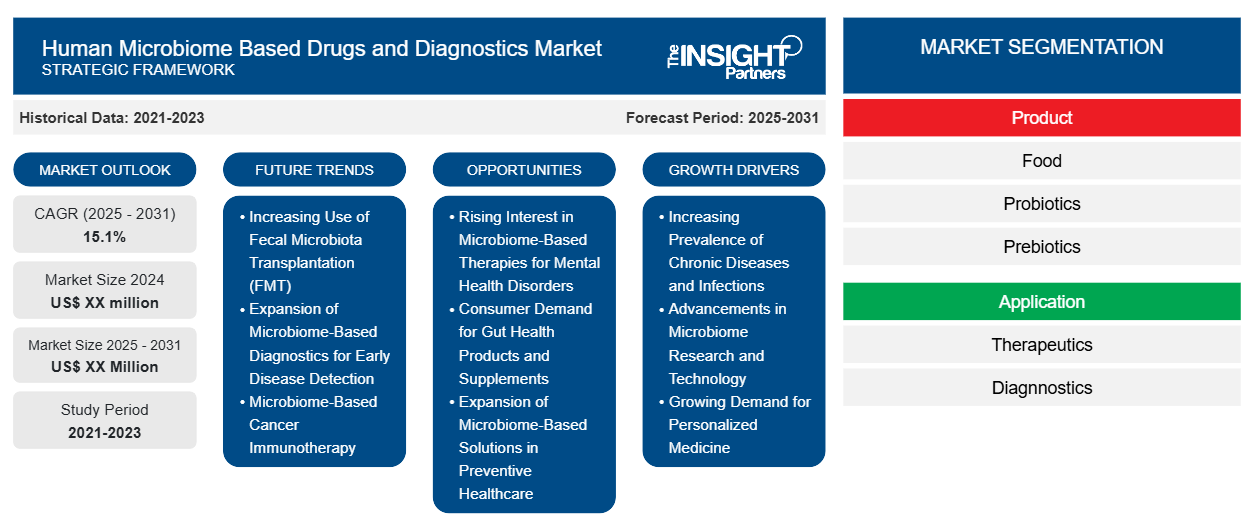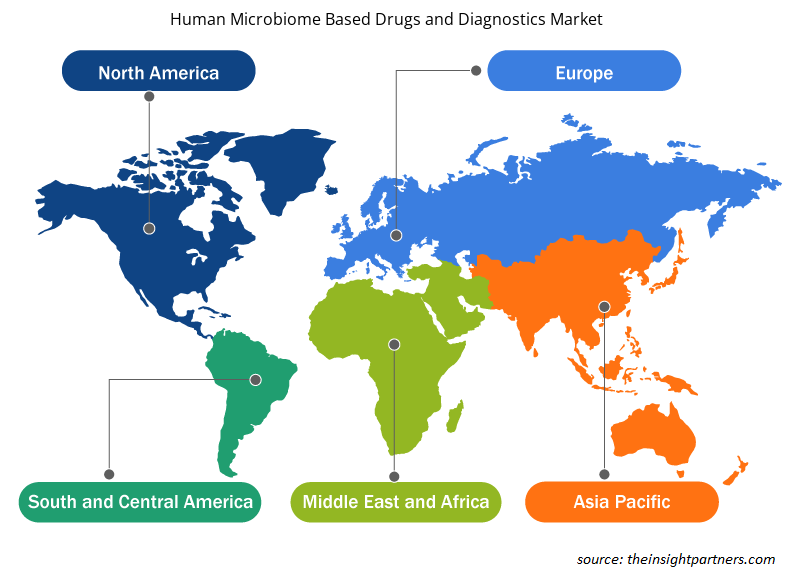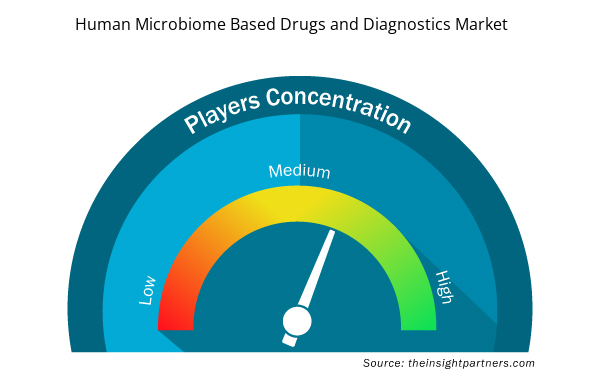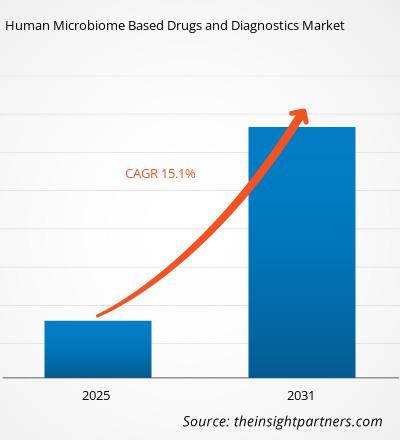The Human Microbiome Based Drugs and Diagnostics Market is expected to register a CAGR of 15.1% from 2025 to 2031, with a market size expanding from US$ XX million in 2024 to US$ XX Million by 2031.
The report is segmented by Product (Food, Probiotics, Prebiotics, Medical Food, Diagnostic Devices, Drugs, Other Probiotic Supplements); Application (Therapeutics, Diagnostics); Disease (Acute Diarrhea, Obesity, Diabetes, Autoimmune Disorders, Cancer, Mental Disorders, Other Diseases); Research Spending, product Type (Instruments, Consumables); and Technology Type (Cell Culture Technology, High Throughput Technology, Omics Technology) . The global analysis is broken down at the regional level and for major countries. The market evaluation is presented in US$ for the above segmental analysis.
Purpose of the Report
The report Human Microbiome Based Drugs and Diagnostics Market by The Insight Partners aims to describe the present landscape and future growth, top driving factors, challenges, and opportunities. This will provide insights to various business stakeholders, such as:
- Technology Providers/Manufacturers: To understand the evolving market dynamics and know the potential growth opportunities, enabling them to make informed strategic decisions.
- Investors: To conduct a comprehensive trend analysis regarding the market growth rate, market financial projections, and opportunities that exist across the value chain.
- Regulatory bodies: To regulate policies and police activities in the market with the aim of minimizing abuse, preserving investor trust and confidence, and upholding the integrity and stability of the market.
Human Microbiome Based Drugs and Diagnostics Market Segmentation
Product
- Food
- Probiotics
- Prebiotics
- Medical Food
- Diagnostic Devices
- Drugs
- Other Probiotic Supplements
Application
- Therapeutics
- Diagnnostics
Disease
- Acute Diarrhea
- Obesity
- Diabetes
- Autoimmune Disorders
- Cancer
- Mental Disorders
- Other Diseases
Product Type
- Instruments
- Consumables
Technology Type
- Cell Culture Technology
- High Throughput Technology
- Omics Technology
Customize This Report To Suit Your Requirement
You will get customization on any report - free of charge - including parts of this report, or country-level analysis, Excel Data pack, as well as avail great offers and discounts for start-ups & universities
Human Microbiome Based Drugs and Diagnostics Market: Strategic Insights

- Get Top Key Market Trends of this report.This FREE sample will include data analysis, ranging from market trends to estimates and forecasts.
Human Microbiome Based Drugs and Diagnostics Market Growth Drivers
- Increasing Prevalence of Chronic Diseases and Infections: The escalating number of chronic diseases and infections functions as a major growth catalyst for the market of drugs and diagnostics based on the human microbiome. Medical research has shown that imbalances within the human microbiome contribute to the development of chronic diseases like diabetes along with obesity and cardiovascular conditions. The composition and diversity of gut bacteria undergo changes due to these disorders which lead to progression of diseases. While scientists discover more about the microbiome's role in health and disease microbiome-based therapeutics and diagnostics become promising solutions for disease management. Interest in microbiome-based treatments grows because infections from antibiotic-resistant pathogens present a critical challenge. Traditional antibiotics disturb the microbiome balance which results in negative side effects and helps antibiotic resistance develop. Through precision therapeutics that focus on the microbiome scientists can produce drugs and therapies which support beneficial microbes and decrease harmful ones that could lead to more effective and sustainable treatments. Microbiome-based diagnostics enable patients to receive prompt detection and tailored treatments that result in better medical results. The global increase in chronic diseases and infections positions microbiome-based drugs and diagnostics as healthcare's new cutting-edge solution for improved treatment and management of these common health issues. The market will receive sustained investment and innovation as more people understand how the microbiome affects health and disease which will lead to new treatments and diagnostic tools.
- Advancements in Microbiome Research and Technology: Technological and research breakthroughs in microbiome studies function as the primary force propelling growth in the market for human microbiome-based pharmaceuticals and diagnostic tools. Recent scientific breakthroughs have expanded our knowledge about the human microbiome which controls essential physiological processes such as metabolism, immunity, and neurological functions. Scientists now have the capability to identify and comprehend how particular microbial communities impact health through high-throughput DNA sequencing technologies that sequence and analyze microbiomes. Researchers can now create therapies targeting the microbiome to prevent diseases and treat medical conditions because of these technologies. The progression of bioinformatics technology combined with machine learning and artificial intelligence systems is accelerating research in microbiome science through enhanced analysis capabilities for large microbiome datasets. Researchers now have the ability to pinpoint microbial markers for diagnostic use which opens pathways for personalized health treatment strategies. Pharmaceutical and biotech firms are now channeling more funds into developing drugs and diagnostic tools based on microbiome research. Increased research activity has produced a growing range of microbiome-based treatments for gastrointestinal disorders and autoimmune diseases as well as mental health issues like depression and anxiety. The expanding research on the microbiome alongside advanced technological developments drive market growth which transforms microbiome-based treatments and diagnostics into practical solutions for healthcare providers and patients.
- Growing Demand for Personalized Medicine: The transition to personalized medicine is boosting the human microbiome-based drugs and diagnostics market substantially. Personalized medicine uses individual genetic makeup, lifestyle choices, and microbiome composition to create treatment plans which are now recognized as a more effective healthcare strategy. The human microbiome determines patient response to specific medications and treatments like cancer therapies and anti-inflammatory drugs. Healthcare providers can develop personalized treatment plans by studying an individual’s microbiome which reveals their distinct microbial profile. Personalized medicine improves treatment results while minimizing adverse effects because treatments are customized to meet individual patient requirements. Advancements in microbiome-based diagnostics are emerging due to the increased need for personalized medicine which enables the identification of disease biomarkers and prediction of treatment responses in patients. The pace of this trend will likely increase through further research into how the microbiome affects drug metabolism along with immune responses and disease development. Because the healthcare industry continues to adopt personalized treatment approaches the market for drugs and diagnostics based on microbiome research will keep growing which will create new avenues for innovation and business expansion.
Human Microbiome Based Drugs and Diagnostics Market Future Trends
- Increasing Use of Fecal Microbiota Transplantation (FMT): The use of fecal microbiota transplantation (FMT) has become a major trend within the human microbiome-based drugs industry. FMT transfers healthy fecal matter from donors into patients' gastrointestinal systems to reestablish a balanced microbial population. The treatment method demonstrates effectiveness particularly against recurrent Clostridium difficile infections that traditional antibiotics struggle to cure. Medical practitioners are now using FMT as a standard treatment for multiple gastrointestinal diseases while researchers assess its effectiveness for conditions like inflammatory bowel disease (IBD), irritable bowel syndrome (IBS), and neurological disorders. Market expansion occurs as FMT acceptance grows due to its potential use for various medical conditions. Standardized and less invasive administration methods for FMT like capsules and oral tablets will likely lead to higher clinical adoption. The expanding pool of research evidence supporting FMT effectiveness predicts this technique will become essential in future microbiome therapies.
- Expansion of Microbiome-Based Diagnostics for Early Disease Detection: The market is being transformed by the expansion of microbiome-based diagnostics for early disease detection. Research advancements in microbiome science have shown that microbial imbalances known as dysbiosis function as early warning signs for numerous diseases including gastrointestinal disorders and diabetes as well as cardiovascular diseases and cancers. Diagnostic tools that analyze microbiome composition can detect disease risk biomarkers which supports early treatment and personalized medical approaches. Healthcare providers are changing disease prevention and management practices because microbiome-based diagnostics are becoming more prevalent. Non-invasive diagnostic options like stool and saliva tests simplify disease screening and health status monitoring for patients. Through earlier disease detection and more precise treatment plans these advancements will lead to better patient results. The market for microbiome-based diagnostics will likely expand quickly due to ongoing research about microbiome-disease connections which will create substantial growth opportunities in clinical and commercial sectors.
- Microbiome-Based Cancer Immunotherapy: Microbiome-based cancer immunotherapy represents a modern development in oncological research that creates new treatment possibilities for multiple types of cancer. Studies indicate that microbiome composition affects how well cancer immunotherapies like checkpoint inhibitors function since these treatments boost immune responses against tumor cells. Some microbial communities improve immunotherapy effectiveness while others reduce it. Researchers are employing microbiome-based drugs like probiotics and dietary changes to boost cancer immunotherapy results and patient recovery rates. Current trends show increasing interest in developing treatments that alter the microbiome to work alongside existing cancer therapies which creates opportunities for personalized cancer care. Development in this area will enable microbiome-based cancer immunotherapy to take its place as a major component of immunotherapy overall while stimulating expansion in the human microbiome-based drugs and diagnostics sector.
Human Microbiome Based Drugs and Diagnostics Market Opportunities
- Rising Interest in Microbiome-Based Therapies for Mental Health Disorders: The human microbiome-based drug and diagnostic market shows rapid growth because of the potential applications of microbiome-based therapies for mental health disorders. The relationship between gut health and mental health is increasingly being recognized through studies on the gut-brain axis which show that the microbiome regulates brain function and behavior which affects depression, anxiety and neurodevelopmental disorders like autism spectrum disorder (ASD). As people become more knowledgeable about how the microbiome affects mental health they start to see microbiome-based treatments as an effective alternative to standard psychiatric medications. Research shows gut microbiome composition changes influence neurotransmitter production such as serotonin and dopamine which regulate mood. Researchers are now studying probiotics and prebiotics as microbiome-based treatments which could help restore healthy gut function and improve mental health results. Microbiome-based diagnostics assist in discovering mental health condition biomarkers which enable healthcare providers to create better-targeted and efficient treatment plans. Due to the increasing occurrence of mental health disorders around the world and the limitations of existing treatments which include side effects and effectiveness problems with traditional drugs the interest in microbiome-based treatment options is increasing. New therapeutic possibilities targeting mental health have emerged due to increasing scientific acknowledgement of the gut-brain connection which supports microbiome-based treatment development. Research findings showing microbiome modulation benefits for mood and cognition present companies focused on microbiome treatments with major opportunities to enter the growing market for mental health solutions. If these therapies prove effective they will revolutionize mental health treatment methods and fuel substantial market expansion for drugs and diagnostics based on the human microbiome.
- Consumer Demand for Gut Health Products and Supplements: The market for human microbiome-based drugs and diagnostics also benefits from increasing consumer demand for gut health products and supplements. Consumers who recognize the crucial role of gut health in their total wellness show more interest in products designed to support a balanced microbiome. More people are seeking out probiotics, prebiotics and symbiotics due to their proven benefits for digestive health support which includes immune system enhancement and gut-brain axis-related mental health improvements. Consumers display a growing preference for gut health products as they become more invested in preventive care and natural remedies instead of traditional pharmaceutical approaches. Scientific studies uncovering the gut microbiome's connection to several diseases lead consumers to learn more about how a balanced microbiome provides health advantages. There is now more microbiome-based supplements available to consumers because they are marketed as ways to support gut microbiome health and prevent microbial imbalances known as dysbiosis. Businesses are now developing microbiome-based supplements that are personalized to fit the distinct microbiome compositions of individuals. Personalized products gain popularity because more people want custom health solutions. The dietary supplement market generates billions of dollars annually while microbiome-focused products expand rapidly within this sector. Manufacturers of probiotics, prebiotics and microbiome diagnostic tools have substantial business opportunities because consumer demand for gut health products continues to rise. Companies that can capitalize on this growing trend by developing high-quality, evidence-backed products and offering targeted marketing strategies stand to benefit from a substantial share of the market.
- Expansion of Microbiome-Based Solutions in Preventive Healthcare: Organizations that produce high-quality products with scientific backing and implement specific marketing plans can seize a large market share from this rising trend. Microbiome-based therapies and diagnostics develop into fundamental instruments for early disease identification and health improvement as healthcare systems worldwide move towards preventive care models instead of reactive treatments. Research shows that the human microbiome contributes to various chronic illnesses such as heart disease, diabetes, autoimmune disorders, and specific cancer types. Through microbiome assessment and modulation we can discover health risks early before symptoms appear which allows us to intervene sooner. Advanced microbiome diagnostics allow people to understand their microbial composition which aids in disease susceptibility prediction and provides insights into metabolic health monitoring and immune function assessment. The growing popularity of preventive strategies like probiotics and prebiotics along with dietary changes derived from microbiome analysis stems from their ability to sustain a balanced microbiome which optimizes health. Managing obesity and type 2 diabetes becomes advantageous through early microbiome adjustments since these lifestyle-related conditions can be prevented from developing. As people become more attentive to their health and focus on wellness together with disease prevention the market for microbiome-based solutions will likely expand. The market potential for companies offering microbiome-based diagnostics and treatments exists because these services help individuals manage their health through personalized approaches. The human microbiome-based drugs and diagnostics market is expected to expand because personalized preventive healthcare attracts more attention.
Human Microbiome Based Drugs and Diagnostics Market Regional Insights
The regional trends and factors influencing the Human Microbiome Based Drugs and Diagnostics Market throughout the forecast period have been thoroughly explained by the analysts at Insight Partners. This section also discusses Human Microbiome Based Drugs and Diagnostics Market segments and geography across North America, Europe, Asia Pacific, Middle East and Africa, and South and Central America.

- Get the Regional Specific Data for Human Microbiome Based Drugs and Diagnostics Market
Human Microbiome Based Drugs and Diagnostics Market Report Scope
| Report Attribute | Details |
|---|---|
| Market size in 2024 | US$ XX million |
| Market Size by 2031 | US$ XX Million |
| Global CAGR (2025 - 2031) | 15.1% |
| Historical Data | 2021-2023 |
| Forecast period | 2025-2031 |
| Segments Covered |
By Product
|
| Regions and Countries Covered | North America
|
| Market leaders and key company profiles |
Human Microbiome Based Drugs and Diagnostics Market Players Density: Understanding Its Impact on Business Dynamics
The Human Microbiome Based Drugs and Diagnostics Market market is growing rapidly, driven by increasing end-user demand due to factors such as evolving consumer preferences, technological advancements, and greater awareness of the product's benefits. As demand rises, businesses are expanding their offerings, innovating to meet consumer needs, and capitalizing on emerging trends, which further fuels market growth.
Market players density refers to the distribution of firms or companies operating within a particular market or industry. It indicates how many competitors (market players) are present in a given market space relative to its size or total market value.
Major Companies operating in the Human Microbiome Based Drugs and Diagnostics Market are:
- Second Genome, Inc.,
- Enterome Bioscience
- Yakult
- DuPont
- Vedanta BioSciences,
- Metabiomics corporation
Disclaimer: The companies listed above are not ranked in any particular order.

- Get the Human Microbiome Based Drugs and Diagnostics Market top key players overview
Key Selling Points
- Comprehensive Coverage: The report comprehensively covers the analysis of products, services, types, and end users of the Human Microbiome Based Drugs and Diagnostics Market, providing a holistic landscape.
- Expert Analysis: The report is compiled based on the in-depth understanding of industry experts and analysts.
- Up-to-date Information: The report assures business relevance due to its coverage of recent information and data trends.
- Customization Options: This report can be customized to cater to specific client requirements and suit the business strategies aptly.
The research report on the Human Microbiome Based Drugs and Diagnostics Market can, therefore, help spearhead the trail of decoding and understanding the industry scenario and growth prospects. Although there can be a few valid concerns, the overall benefits of this report tend to outweigh the disadvantages.
- Historical Analysis (2 Years), Base Year, Forecast (7 Years) with CAGR
- PEST and SWOT Analysis
- Market Size Value / Volume - Global, Regional, Country
- Industry and Competitive Landscape
- Excel Dataset


- Semiconductor Metrology and Inspection Market
- Sexual Wellness Market
- Electronic Data Interchange Market
- Long Read Sequencing Market
- Batter and Breader Premixes Market
- Clinical Trial Supplies Market
- Photo Editing Software Market
- Medical Enzyme Technology Market
- Smart Parking Market
- Fixed-Base Operator Market

Report Coverage
Revenue forecast, Company Analysis, Industry landscape, Growth factors, and Trends

Segment Covered
This text is related
to segments covered.

Regional Scope
North America, Europe, Asia Pacific, Middle East & Africa, South & Central America

Country Scope
This text is related
to country scope.
Frequently Asked Questions
The Human Microbiome Based Drugs and Diagnostics Market is estimated to witness a CAGR of 15.1% from 2025 to 2031.
The major factors driving the Human Microbiome Based Drugs and Diagnostics Market are Increasing Prevalence of Chronic Diseases and Infections, Advancements in Microbiome Research and Technology, and Growing Demand for Personalized Medicine.
Future trends in the Human Microbiome Based Drugs and Diagnostics Market are Increasing Use of Fecal Microbiota Transplantation (FMT), Expansion of Microbiome-Based Diagnostics for Early Disease Detection, and Microbiome-Based Cancer Immunotherapy.
Some of the players operating in the market are Second Genome, Inc., Enterome Bioscience, Yakult, DuPont, Vedanta BioSciences, Metabiomics corporation, ViThera Pharmaceuticals, MicroBiome Therapeutics LLC, Merck, Osel.
The report can be delivered in PDF/PPT format; we can also share an excel datasheet based on the request.
Some customization options available based on the request are an additional 3–5 company profiles and a country-specific analysis of 3–5 countries of your choice. Customizations are to be requested/discussed before making final order confirmation# as our team would review the same and check the feasibility.
Trends and growth analysis reports related to Life Sciences : READ MORE..
1. Second Genome Inc
2. Enterome Bioscience
3. Yakult
4. DuPont
5. Vedanta BioSciences
6. Metabiomics Corporation
7. ViThera Pharmaceuticals
8. MicroBiome Therapeutics LLC
9. Merck
10. Osel

 Get Free Sample For
Get Free Sample For